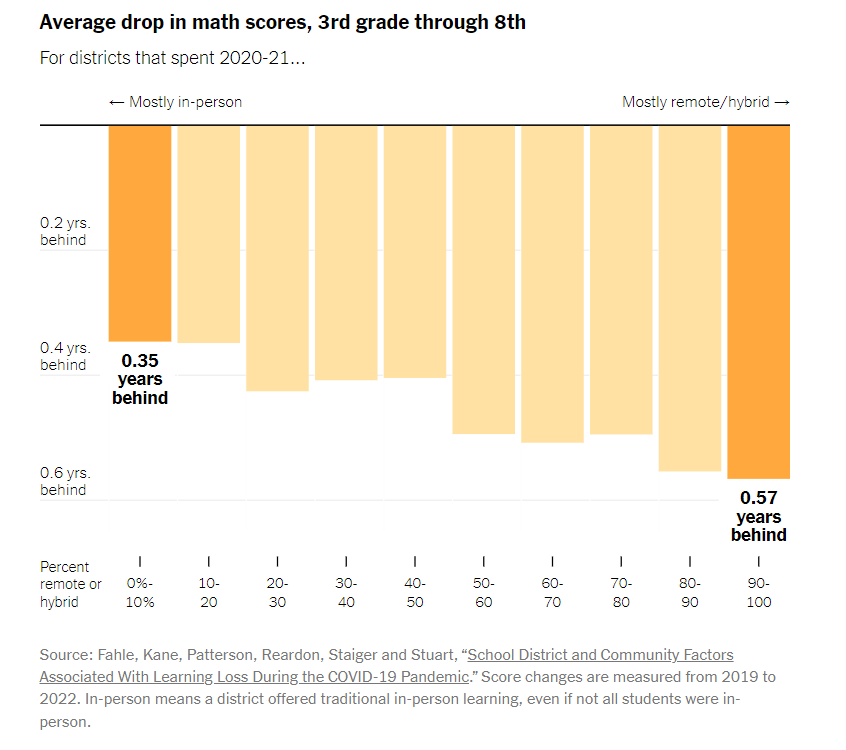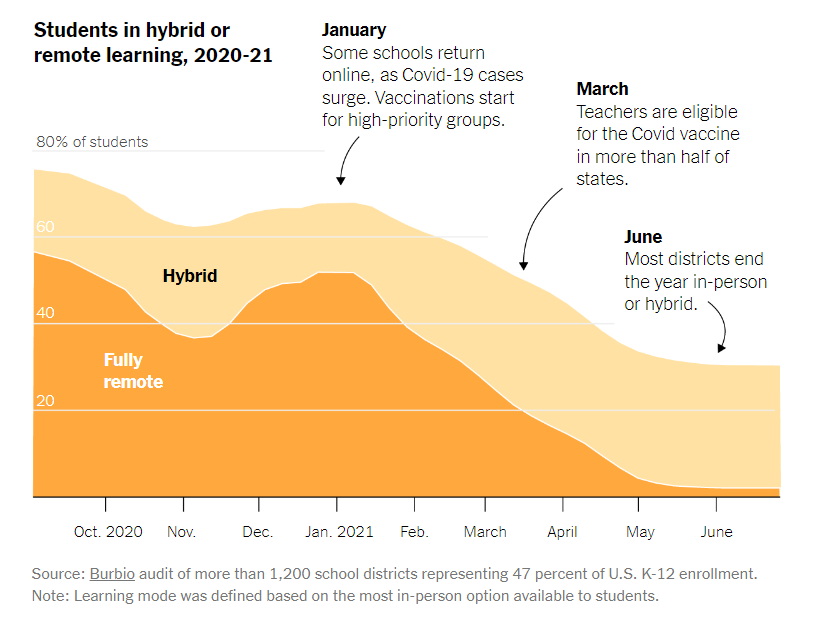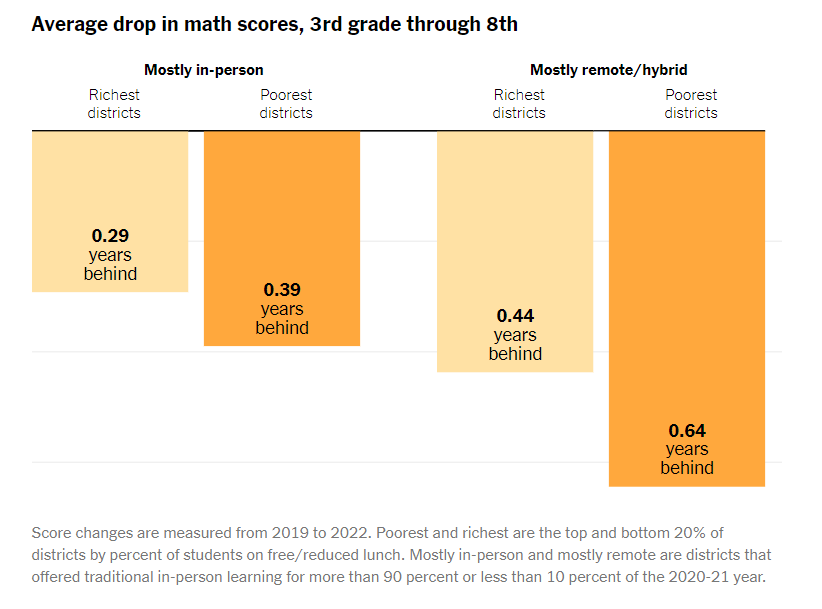Welcome to DU!
The truly grassroots left-of-center political community where regular people, not algorithms, drive the discussions and set the standards.
Join the community:
Create a free account
Support DU (and get rid of ads!):
Become a Star Member
Latest Breaking News
General Discussion
The DU Lounge
All Forums
Issue Forums
Culture Forums
Alliance Forums
Region Forums
Support Forums
Help & Search
General Discussion
Showing Original Post only (View all)What the Data Says About Pandemic School Closures, Four Years Later [View all]
The more time students spent in remote instruction, the further they fell behind. And, experts say, extended closures did little to stop the spread of Covid.https://www.nytimes.com/2024/03/18/upshot/pandemic-school-closures-data.html
https://archive.is/TsmZI
Four years ago this month, schools nationwide began to shut down, igniting one of the most polarizing and partisan debates of the pandemic. Some schools, often in Republican-led states and rural areas, reopened by fall 2020. Others, typically in large cities and states led by Democrats, would not fully reopen for another year. A variety of data — about children’s academic outcomes and about the spread of Covid-19 — has accumulated in the time since. Today, there is broad acknowledgment among many public health and education experts that extended school closures did not significantly stop the spread of Covid, while the academic harms for children have been large and long-lasting. While poverty and other factors also played a role, remote learning was a key driver of academic declines during the pandemic, research shows — a finding that held true across income levels.

“There’s fairly good consensus that, in general, as a society, we probably kept kids out of school longer than we should have,” said Dr. Sean O’Leary, a pediatric infectious disease specialist who helped write guidance for the American Academy of Pediatrics, which recommended in June 2020 that schools reopen with safety measures in place. There were no easy decisions at the time. Officials had to weigh the risks of an emerging virus against the academic and mental health consequences of closing schools. And even schools that reopened quickly, by the fall of 2020, have seen lasting effects. But as experts plan for the next public health emergency, whatever it may be, a growing body of research shows that pandemic school closures came at a steep cost to students.
The longer schools were closed, the more students fell behind.
At the state level, more time spent in remote or hybrid instruction in the 2020-21 school year was associated with larger drops in test scores, according to a New York Times analysis of school closure data and results from the National Assessment of Educational Progress, an authoritative exam administered to a national sample of fourth- and eighth-grade students. At the school district level, that finding also holds, according to an analysis of test scores from third through eighth grade in thousands of U.S. districts, led by researchers at Stanford and Harvard. In districts where students spent most of the 2020-21 school year learning remotely, they fell more than half a grade behind in math on average, while in districts that spent most of the year in person they lost just over a third of a grade. (A separate study of nearly 10,000 schools found similar results.)
Such losses can be hard to overcome, without significant interventions. The most recent test scores, from spring 2023, show that students, overall, are not caught up from their pandemic losses, with larger gaps remaining among students that lost the most ground to begin with. Students in districts that were remote or hybrid the longest — at least 90 percent of the 2020-21 school year — still had almost double the ground to make up compared with students in districts that allowed students back for most of the year. Some time in person was better than no time. As districts shifted toward in-person learning as the year went on, students that were offered a hybrid schedule (a few hours or days a week in person, with the rest online) did better, on average, than those in places where school was fully remote, but worse than those in places that had school fully in person.

snip

snip
InfoView thread info, including edit history
TrashPut this thread in your Trash Can (My DU » Trash Can)
BookmarkAdd this thread to your Bookmarks (My DU » Bookmarks)
90 replies, 5571 views
ShareGet links to this post and/or share on social media
AlertAlert this post for a rule violation
PowersThere are no powers you can use on this post
EditCannot edit other people's posts
ReplyReply to this post
EditCannot edit other people's posts
Rec (32)
ReplyReply to this post
90 replies
 = new reply since forum marked as read
Highlight:
NoneDon't highlight anything
5 newestHighlight 5 most recent replies
= new reply since forum marked as read
Highlight:
NoneDon't highlight anything
5 newestHighlight 5 most recent replies
Question how many senior citizens and other aged infirmed people are still alive because kids weren't bringing home....
usaf-vet
Mar 24
#78
It seems pretty obvious: the longer kids aren't learning in school or at home, they further they fall behind.
sop
Mar 24
#6
"The shutdowns in America didn't work because there was never full compliance. Ever."
Hugin
Mar 24
#17
Esactly. The shutdowns were a joke. We should have really shut down, completely for a few weeks and ended the spread.
lindysalsagal
Mar 24
#20
This is the correct response to the article. Remote learning does not directly correlate with self-controlled isolation.
keopeli
Mar 24
#40
I serve on a School Board. COVID had huge impacts on academic success and learning skills
brooklynite
Mar 24
#11
What about the deaths of educators pressured into working during a lethal viral pandemic?
Timeflyer
Mar 24
#12
Extremely little coverage of teacher losses. Tells you how much we don't value our teachers.
lindysalsagal
Mar 24
#21
They should add to the charts the in-school students who got sick and the in-school students who died.
Liberal In Texas
Mar 24
#13
A lot of these "public health and education experts" are people like Ron Desantis and Dr. Joseph Ladapo.
sop
Mar 24
#18
These averages are misleading: There are always students who can just "do the math" with or without teachers
lindysalsagal
Mar 24
#22
You have thick skin to not to be a little freaked by exponential viral spread with overcapacity emergency rooms. nt
Shermann
Mar 24
#26
Public health measures in the pandemic tried to balance competing risks, each unknown.
hay rick
Mar 24
#53
New Zealand had a high rate of spread as well as Singapore even with Draconian mitigation measures.
Yavin4
Mar 24
#69
It seemed obvious and I advocated for just redoing the Covid two years and every educator said that would be wrong.
dutch777
Mar 24
#52
Hmm - "experts say, extended closures did little to stop the spread of Covid" isn't backed up with much
muriel_volestrangler
Mar 24
#58
And even if children were found to be less likely to become seriously ill, their parents and grandparents
Scrivener7
Mar 24
#63
Turns out "if the transmissibility of subclinical infections is low" was a big "if"
muriel_volestrangler
Mar 27
#90
I'm glad we're learning from the mistakes made during COVID so we're much better prepared when the next
beaglelover
Mar 24
#64
The educational establishment are the ones that consider themselves as the experts
MichMan
Mar 24
#82